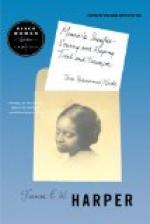So hastily opening his pen-knife he cut his own feet so that the blood from them might deepen the scent on one track, and throw them off from Louis’s path.
It was a brave deed, and nobly done, and Louis began to feel that he had never known them, and then how vividly came into his mind the words of Dr. Charming: “After all we may be trampling on one of the best branches of the human race.” Here were men and women too who had been trampled on for ages ready to break to him their bread, aye share with him their scanty store.
One had taken the shoes from his feet and almost forced him to take them. What was it impelled these people? What was the Union to them, and who were Lincoln’s soldiers that they should be so ready to gravitate to the Union army and bring the most reliable information to the American General?
Was it not the hope of freedom which they were binding as amulets around their hearts? They as a race had lived in a measure upon an idea; it was the hope of a deliverance yet to come. Faith in God had underlain the life of the race, and was it strange if when even some of our politicians did not or could not read the signs of the times aright these people with deeper intuitions understood the war better than they did.
But at last Louis got beyond the borders of the confederacy, and stood once more on free soil, appreciating that section as he had never done before.
Chapter XV
[Text missing.]
Chapter XVI
“And I,” said Minnie, “will help you pay it.”
And so their young hearts had met at last, and with the approval and hearty consent of Anna, Minnie and Louis were married.
It was decided that Minnie should spend the winter in Southern France, and then in the spring they returned to America. On their arrival they found the war still raging, and Louis was ready and anxious to benefit that race to whom he felt he owed his life, and with whom he was connected by lineage.
He had plenty of money, a liberal education, and could have chosen a life of ease, but he was too ardent in his temperament, too decided in his character, not to feel an interest in the great events which were then transpiring in the country.
He made the acquaintance of some Anti-Slavery friends, and listened with avidity to their doctrines; he attended a number of war meetings, and caught the enthusiasm which inspired the young men who were coming from valley, hill, and plain to fill up the broken ranks of the Union army.
Minnie, educated in peace principles, could not conscientiously encourage him, and yet when she saw how the liberty of a whole race was trembling in the balance she could not help wishing [success?] to the army, nor find it in her heart to dissuade him from going.
Others had given their loved and cherished ones to camp and field. The son of a dear friend had said to his mother, “I know I shall be killed, but I go to free the slave.” His presentiment had been met, for he had been brought home in his shroud.




